From 15th-17th November the International Marxist Tendency held the IMT Winter School 2013, hosted by UCLU Marxist Society. Over 130 attendees from across the country and the rest of northern Europe - and even the USA! - descended on UCL for the weekend to discuss why ‘Marx Was Right’ and debate the relevance of Marxism today.
The school included talks on subjects ranging from the struggle for women’s liberation to the Great Crash of 1929, as well as special events and socials taking place throughout the weekend. On Friday afternoon attendees convened in King’s Cross to begin a wonderfully detailed tour of Lenin’s London – the places where Lenin, the leading member of the Russian Revolution, lived, wrote, drank and formed the basis of the most successful revolutionary party in history. Rob Sewell, editor of Socialist Appeal, led the tour party through Bloomsbury and Clerkenwell, stopping at such haunts as the house where the Iskra editorial board lived and where Lenin met Trotsky in 1902, as well as the site of the Congress where the Bolsheviks and Mensheviks split first began.
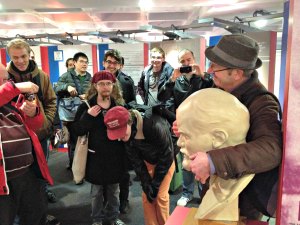 Rob Sewell with the bust of LeninThe walk ended with a drink at Lenin’s local pub The Crown Tavern, before everyone headed on to a revolutionary social and the opening of the IMT Havana Book Fair at UCL. Students from around London joined the British, Danish, Swedish and Swiss comrades browsing through reams of new and second-hand political literature and sharing in the revolutionary spirit of the evening.
Rob Sewell with the bust of LeninThe walk ended with a drink at Lenin’s local pub The Crown Tavern, before everyone headed on to a revolutionary social and the opening of the IMT Havana Book Fair at UCL. Students from around London joined the British, Danish, Swedish and Swiss comrades browsing through reams of new and second-hand political literature and sharing in the revolutionary spirit of the evening.
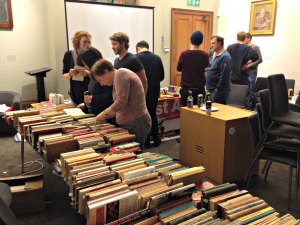 The IMT book fair and socialOn Saturday morning the Winter School sessions kicked off with a talk on the Prospects for World Revolution by Jorge Martin, editor of ‘America Socialista’ magazine and co-author of ‘Revolution until Victory!’. A wide-ranging discussion followed the talk, with perspectives on Greece, Spain and the Indian subcontinent, and one from an international student from Bulgaria on her home country, amongst others. These perspectives served to emphasise the need for an international revolutionary organisation to carry the current prospects through to the overthrow of world capitalism.
The IMT book fair and socialOn Saturday morning the Winter School sessions kicked off with a talk on the Prospects for World Revolution by Jorge Martin, editor of ‘America Socialista’ magazine and co-author of ‘Revolution until Victory!’. A wide-ranging discussion followed the talk, with perspectives on Greece, Spain and the Indian subcontinent, and one from an international student from Bulgaria on her home country, amongst others. These perspectives served to emphasise the need for an international revolutionary organisation to carry the current prospects through to the overthrow of world capitalism.
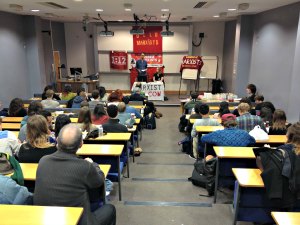 Daniel Morley speaking on Marx and HegelTalks then divided up into two parallel sessions. Daniel Morley from the editorial board of Socialist Appeal led off on “Marx, Hegel and Dialectics”. Comrades discussed how the origins of Marxist philosophy could be found in Hegel’s dialectical method, as well as the necessary scientific basis for socialism. In the other session on “Marxism and History”, author of ‘Behind the Myths’, John Pickard, gave a talk on historical materialism, preceding a wide-ranging discussion, which included points on the historical basis of Asiatic despotism.
Daniel Morley speaking on Marx and HegelTalks then divided up into two parallel sessions. Daniel Morley from the editorial board of Socialist Appeal led off on “Marx, Hegel and Dialectics”. Comrades discussed how the origins of Marxist philosophy could be found in Hegel’s dialectical method, as well as the necessary scientific basis for socialism. In the other session on “Marxism and History”, author of ‘Behind the Myths’, John Pickard, gave a talk on historical materialism, preceding a wide-ranging discussion, which included points on the historical basis of Asiatic despotism.
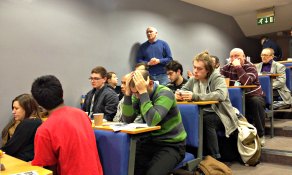 Labour councillor Gary WareingSaturday’s sessions finished with Rob Sewell giving a talk comparing the Great Crash of 1929 with today. The conclusions drawn from the rousing speech and the ensuing discussion provided optimism for Marxists, since it was pointed out that the material basis for fascism and imperialist warfare to crush the working class and bail out a failing system is now much weaker than it had been following the Great Depression. The working class and the potential for socialism internationally has never been stronger than today.
Labour councillor Gary WareingSaturday’s sessions finished with Rob Sewell giving a talk comparing the Great Crash of 1929 with today. The conclusions drawn from the rousing speech and the ensuing discussion provided optimism for Marxists, since it was pointed out that the material basis for fascism and imperialist warfare to crush the working class and bail out a failing system is now much weaker than it had been following the Great Depression. The working class and the potential for socialism internationally has never been stronger than today.
Saturday evening was another chance for socialising and the continuation of the book fair, with attendees having a chance to carry on the day’s discussions whilst enjoying a drink and helping to raise money for the fighting fund.
The final day began with a talk by Alan Woods, author of “Bolshevism: the Road to Revolution”, on the Russian Revolution and the lessons of October 1917. Many interesting discussion points were raised, including on the important role that women played in the revolution, and the role that the revolution in turn had in emancipating Russian women.
This topic led nicely into the session that followed, where Marie Fredriksson, editor of the Danish Marxist magazine ‘Socialistisk Standpunkt’, led off a discussion on Marxism and Women’s Liberation. A variety of contributions stressed the need to place feminism on a class basis, showing how the fundamentally progressive theory of Marxism presupposes the freedom from the double oppression that working women face - freedom that can only be achieved through the socialist transformation of society. Meanwhile, Adam Booth - editor of www.socialist.net - led off a parallel discussion on “Marxism and the State”, in which the complexities of the state’s role in revolution were drawn out in examples such as the Paris Commune of 1871 and the Pinochet coup in Chile 1973.
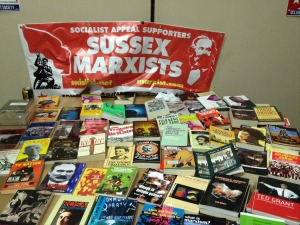 To conclude the school, Alan Woods inspired comrades with an outline of the tasks of Marxists today. He explained that the study of Marxist theory and the task of building a revolutionary party to fight for world socialism go hand in hand, and that it was up to the young comrades in the room to build the forces of Marxism, because the fate of their generation and the future of humanity depended on it. The day ended with a customary rendition of the Internationale.
To conclude the school, Alan Woods inspired comrades with an outline of the tasks of Marxists today. He explained that the study of Marxist theory and the task of building a revolutionary party to fight for world socialism go hand in hand, and that it was up to the young comrades in the room to build the forces of Marxism, because the fate of their generation and the future of humanity depended on it. The day ended with a customary rendition of the Internationale.
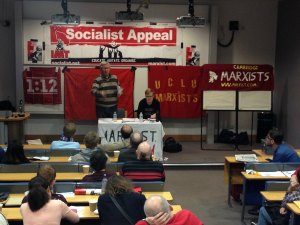 Alan Woods speaking on the Russian revolutionAs Jorge Martin had joked in the opening session of the school, this was the second IMT Winter School in 2013 alone! That the singing rang much louder this time was an indication that Marxist ideas had echoed much further already in the nine months since the last school. All of the attendees commented that they had been very impressed by the weekend and enjoyed it immensely. The confidence and unity of young people through the ideas expanded upon at the Winter School only looks set to continue growing. No one left on Sunday evening in any doubt that, yes: Marx was right.
Alan Woods speaking on the Russian revolutionAs Jorge Martin had joked in the opening session of the school, this was the second IMT Winter School in 2013 alone! That the singing rang much louder this time was an indication that Marxist ideas had echoed much further already in the nine months since the last school. All of the attendees commented that they had been very impressed by the weekend and enjoyed it immensely. The confidence and unity of young people through the ideas expanded upon at the Winter School only looks set to continue growing. No one left on Sunday evening in any doubt that, yes: Marx was right.
